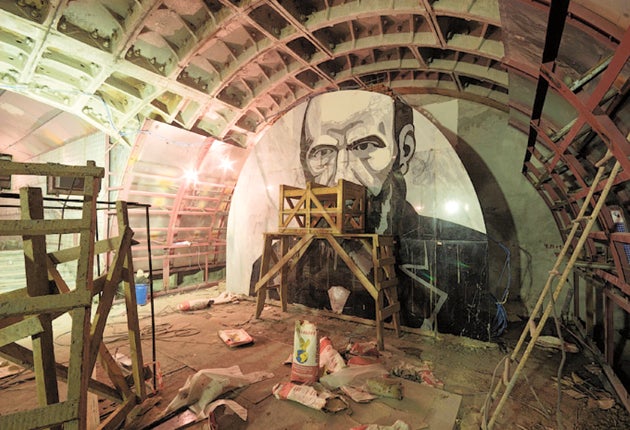Dostoevsky images on metro ‘could cause suicides’

The author of Crime and Punishment never had a reputation for lightness in his soul. Now the Moscow authorities have postponed the opening of a metro station named after Fyodor Dostoevsky over fears that illustrations from his works that decorate it could turn the station into a "mecca for suicides".
The new station was decorated with black and white marble mosaics of scenes from Dostoevsky's most famous novels, including Crime and Punishment, Demons, The Idiot and The Brothers Karamazov. But unsurprisingly for a writer famously preoccupied with death, the scenes include images of suicide and murder.
On one wall, Rodion Raskolnikov from Crime and Punishment brandishes an axe over the elderly pawnbroker Alyona Ivanovna and her sister, his murder victims in the novel. Near by, a character from Demons holds a pistol to his temple.
The pictures quickly caused a sensation. Bloggers and websites called the images that appeared on the internet in April "depressing" amid speculation that the images could attract suicides.
The opening of the station, which was meant to be today, has been put back indefinitely. The metro has refused to comment but the daily Izvestia claims that it was the transport system's chief who raised the question of changing the decorations when he visited the site last week. Sources at the metro told The Independent that the controversy was convenient cover for the fact that the stations are not ready.
The fate of the murals is now in the hands of Moscow's Mayor, Yuri Luzhkov, a man familiar with controversial public art. His love of monolithic bronzes by the Georgian sculptor Zurab Tsereteli has bitterly divided Muscovites. He recently had to back down from plans to put posters of Stalin up around the city for Victory Day.
Whatever the Mayor decides, Ivan Nikolaev, the artist behind the murals, is unapologetic. "What did you want? Scenes of dancing? Dostoevsky doesn't have them," he told Izvestia. "I tried to convey Dostoevsky as a man, an artist, a philosopher."
Join our commenting forum
Join thought-provoking conversations, follow other Independent readers and see their replies
0Comments